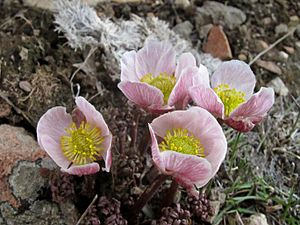Anderson's buttercup facts for kids
Quick facts for kids Anderson's buttercup |
|
|---|---|
 |
|
| Conservation status | |
| Scientific classification |
|
| Kingdom: | Plantae |
| Clade: | Tracheophytes |
| Clade: | Angiosperms |
| Clade: | Eudicots |
| Order: | Ranunculales |
| Family: | Ranunculaceae |
| Genus: | Ranunculus |
| Species: |
R. andersonii
|
| Binomial name | |
| Ranunculus andersonii |
|
| Script error: The function "autoWithCaption" does not exist. | |
Script error: No such module "Check for conflicting parameters".
Ranunculus andersonii is a type of wild flower known as Anderson's buttercup. It is a beautiful plant that grows in the western parts of the United States. You can often find it in places like the Great Basin, growing among sagebrush plants or in open woodlands. This plant is a perennial herb, which means it lives for more than two years.
What Does it Look Like?
Anderson's buttercup starts with a group of thick leaves at its base. This group is called a basal rosette. Each leaf is divided into three smaller parts, called leaflets. These leaflets have a double-lobed shape and sit at the end of a leaf stalk, known as a petiole.
The Flower
The flower of Anderson's buttercup grows on a straight stalk that comes up from the leaf rosette. This stalk usually has no leaves and is often less than 20 centimeters (about 8 inches) tall. Each stalk usually holds one flower.
The flower typically has five petals. These petals can be white or have a reddish tint. Each petal can grow up to 2 centimeters (about 0.8 inches) long. At the base of the petals, you will find white or pinkish sepals. In the center of the flower, there are many yellow stamens and pistils. These are the parts of the flower that help it make seeds.
The Fruit
After the flower blooms, it produces small fruits called achenes. These achenes are grouped together in a round cluster. Each cluster usually has 14 or more of these tiny fruits.
Where Does it Grow?
Anderson's buttercup is native to the western United States. This means it naturally grows in this area. You can find it in the Great Basin region and the areas around it. It likes to grow in different habitats, including areas with sagebrush plants and in woodlands.
How Was it Named?
This special buttercup was named after a person! It was named by a famous botanist named Asa Gray. He named it in honor of Charles Lewis Anderson. Charles Lewis Anderson was also a botanist and a doctor.
 | George Robert Carruthers |
 | Patricia Bath |
 | Jan Ernst Matzeliger |
 | Alexander Miles |


